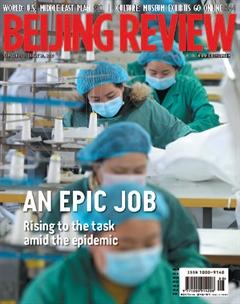DANGERS OF DECOUPLING AMID THE VIRUS
By Josef Gregory Mahoney
While the current novel coronavirus outbreak continues to affect many in China, looming questions remain regarding global impacts related to health, economics and geopolitics. Given current scientific understandings of the disease, including its transmission rates and associated morbidity and mortality (and despite multiple studies indicating a relatively low fatality rate), the costs for China and in particular, Wuhan, the outbreaks epicenter, continue to be substantial.
National and international containment strategies have unfolded quickly—some quite reasonable, others less so, but all fundamentally reactionary—and the economic costs to China and the rest of the world are still unknown but a cause for serious concern. For these reasons and others, the geopolitical knock-on effects likewise are matters that require sober refl ection.
Simplistic thinking
While some economic analysts optimistically point to mid-March as a possible inflection point, it would be a mistake to think that everything can or should return to business as usual. On the one hand, while containment and treatment efforts appear to be working, this epidemic is still active. On the other hand, given the generally negative trend of U.S.-China relations, characterized by some in Washington as a new era of great power competition or worse, the Cold War 2.0, returning to business as usual would be undesirable and even unhealthy.
As some have quietly noted, the impacts on global transportation and supply chains are providing a glimpse of what decoupling might look like. Decoupling is the term that some in Washington and elsewhere have used to describe their vision of future U.S.-China relations, with rhetoric and policies recalling those in play during the Cold War between the U.S. and the USSR. Stripping off the polite veneers of diplomatic discourse, the ahistorically constructed and crudely imagined ambitions of decoupling are twofold: fi rst, to sustain U.S. global hegemony as much as possible, and second, to create manifold pressures that undermine and destroy Chinas political system.

Unfortunately, in the short term, the outbreak may embolden those promoting decoupling. Their logic is that by cutting ties with China and in some narratives, rebuilding manufacturing in the U.S. and so on, the U.S. position will be protected from potentially adverse economic and health effects, among others. Such simplistic thinking has already driven a deep wedge between the U.S. and China, but it has also been at work elsewhere, including Europe, where its local version is the fools errand known as Brexit.
The narratives that promoted Brexit exploited reasonable anger with unreasonable fantasies, with the actual costs far exceeding promised benefits and creating political instability in the UK, including upsetting relatively precarious relations with Scotland and Northern Ireland, and more recently, in Ireland itself, if the recent electoral gains of Sinn Fein are a reliable indicator.
While some say that decoupling is already underway, the idea that one can simply decouple is ludicrous, and all the more so between China and the U.S. and the broader global economy. In fact, coupling between the U.S. and China has been underway since 1979 at least, and arguably, since the Nixon-Kissinger visits in the early 1970s. Today, bilateral trade and investment between the U.S. and China, and between China and those the U.S. counts as its closest allies, as well as other forms of exchanges, are calculated in trillions of dollars and affect billions of people.
In economic terms alone, to cleave relations would be tantamount to slitting ones own throat as well as that of a large percentage of the worlds population at a time when global dangers like climate change and disease outbreaks require more coordination and mutual goodwill.
In fact, while we do not know all of the conditions that led to the current outbreak, we should not be surprised if we discover that problems like climate change and the U.S.-China trade war are cofactors. Global warming has already been linked scientifically to increasing global burdens of disease, including previous outbreaks like the severe acute respiratory syndrome, with associated morbidity and mortality expected to surge dramatically over the coming decade. This is on top of other impacts driven by volatile weather, rising sea levels, contaminated drinking water and so on.
Additionally, while it might not be the case that the U.S.-China trade war had a direct role in the outbreak, it has certainly contributed to difficulties in certain economic sectors in China preceding it and has undermined, according to some reports, efforts to organize U.S. support on Chinas behalf. Those who look positively at the containments associated with the epidemic as a dry run of decoupling should be wary of the response: a wet cough.


